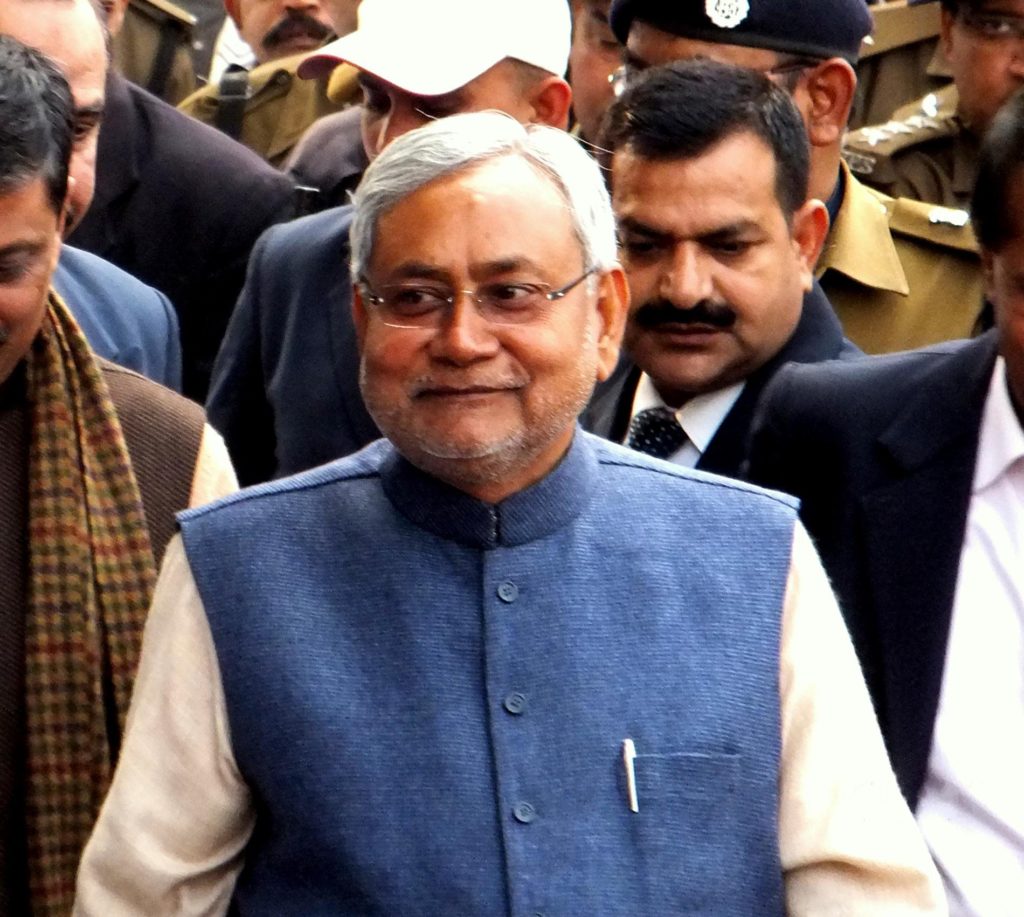A political somersault in the state of Bihar
Bihar Chief Minister Nitish Kumar joined hands with Bharatiya Janata Party (BJP) as he jilted an uncomfortable ally, the Rashtriya Janata Dal (RJD), and became the chief minister for the sixth time. What are the political ramifications for Indian politics?
Often described as the ‘Chanakya’ (a political mastermind) of Bihar politics, Nitish Kumar, 66, quit as the chief minister of Bihar — a politically crucial state, by ending the ‘Mahagathbandhan’ (grand alliance) that comprised his Janata Dal (United) or JD(U), the RJD and the Congress. He subsequently went on to align himself with BJP and get reinstated as the chief minister albeit with different allies.
Why did Kumar quit?
A large number of corruption cases against Lalu Prasad Yadav and his immediate family members along with dynastic politics are the reasons cited by Kumar for ending the political alliance.
However, the fact that he had made up his mind to abandon the alliance has been very clear for some time now. It all started after Prime Minister Narendra Modi’s decision to demonetise high-value currency last November. Kumar broke all rank with alliance partners to support Prime Minister Modi. He said the stated objectives of curbing black money and corruption could be achieved only if note bandi (note ban) was followed up with a war on benami (illegal) property.
Remember the first high-profile target of Modi government’s crackdown on benami property was his alliance partner, RJD chief Lalu Prasad Yadav. Nitish Kumar was uncomfortable sitting with Lalu’s family members, including state deputy chief minister Tejashwi Yadav, who sits next to him at Cabinet meetings, senior minister Tej Pratap Yadav, and Rajya Sabha MP Misa Bharti, who were accused of acquiring benami property worth INR 10 billion (EUR 194 million approximately) through unscrupulous means.
If fighting corruption was Kumar’s motto, was he unaware of this when in 2015 he rode to power on Lalu Prasad Yadav’s back after shunning the BJP for allegedly failing to protect secularism?
Congress general secretary Digvijaya Singh summed up current politics with a couplet: “Usiko haq hai jeene ka is zamane mein/Jo idhar ka dikhta rahe aur udhar ka ho jaye” (They alone survive in these times/Who seem on your side till they join the other).
However, the grand alliance was a tool of convenience for Kumar to remain in power.
Not only were relations strained between JD (U) and RJD, the ties between the JD (U) and the Congress were also not in the best of terms. In the recently concluded Uttar Pradesh (UP) Assembly Elections, Kumar wanted a political alliance with Congress. But Congress vice president Rahul Gandhi chose Akhilesh Yadav instead.
Also, ties between Kumar and Congress deteriorated when Rahul Gandhi declined to announce Gopalkrishna Gandhi as the Opposition’s joint Presidential nominee, as proposed by JD(U) and seconded by the National Congress Party (NCP), Left parties and other opposition leaders, when they met in Chennai to mark the 94th birthday celebrations of Dravida Munnetra Kazhagam (DMK) patriarch, M Karunanidhi on June 4. But Rahul delayed the decision. So when BJP announced Ram Nath Kovind as its nominee, Nitish Kumar drove to Raj Bhavan to congratulate him.
Who gains, who loses?
The end of the grand alliance has political ramifications for Indian politics in the months to come.
The BJP gains the most as it got itself selected to run another state despite losing the election. Thanks to the alliance with Nitish Kumar, it has extended its role in governance to 17 of the 29 states in the country.
First and foremost, the Bihar ‘success’ comes a few months ahead of the next round of state elections. Gujarat, the home state of Prime Minister Narendra Modi, and Himachal Pradesh, one of the few states where the Congress is in power, are due for election in November and December. Chhattisgarh, Karnataka, Madhya Pradesh, Meghalaya, Mizoram, Nagaland, Rajasthan, and Tripura pick new governments in 2018.
Second, BJP has successfully broken the grand secular alliance that could have emerged with Nitish Kumar as the prime ministerial candidate to forge opposition unity to stop the BJP juggernaut ahead of the 2019 general elections.
Third, no doubt Nitish Kumar described as ‘Sushashan Babu’ (good governance man) and ‘Vikas Purush’ (man of progress), whom even critics credit with turning Bihar around, has been able to unload the burden of Lalu and company. Kumar has done business with BJP and it is easier dealing with them compared to RJD.
This goes back to the time when he was railway minister and the bogeys of the Sabarmati Express were gutted in Godhra in February 2002, during the Atal Behari Vajpayee government. He did not even order a statutory inquiry.
The move of Nitish Kumar, who is also the JD(U) president, to end the grand alliance has not found many takers. A murmur of dissent in the party is growing and will soon turn loud.
“Nitishji did not consult the party office bearers before taking such a crucial decision,” said JD(U) Member of Parliament Ali Anwar after his meeting with party’s senior leaders and Rajya Sabha members, Sharad Yadav and MP Veerendra Kumar on Thursday. “It was Nitish Kumar’s individual decision. Sharadji is upset and has said that he will take a decision after consultations with senior leaders in a day or two,” Anwar added.
An Indian Petain in making
Finally, a political observer drew a parallel between Kumar and French leader, Philippe Petain.
Petain was a national hero in France for his role in the defence of Verdun in World War One. The French thought Petain would resurrect the nation’s morale. However, when Paris fell, Petain became the head of the Vichy government, playing an active role in the persecution of Jews and the advancement of Nazi interests.
If BJP were to push its saffron agenda in the state, where does this leave Bihar? How Kumar will play his secular credentials, remains to be seen.










